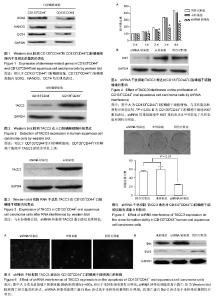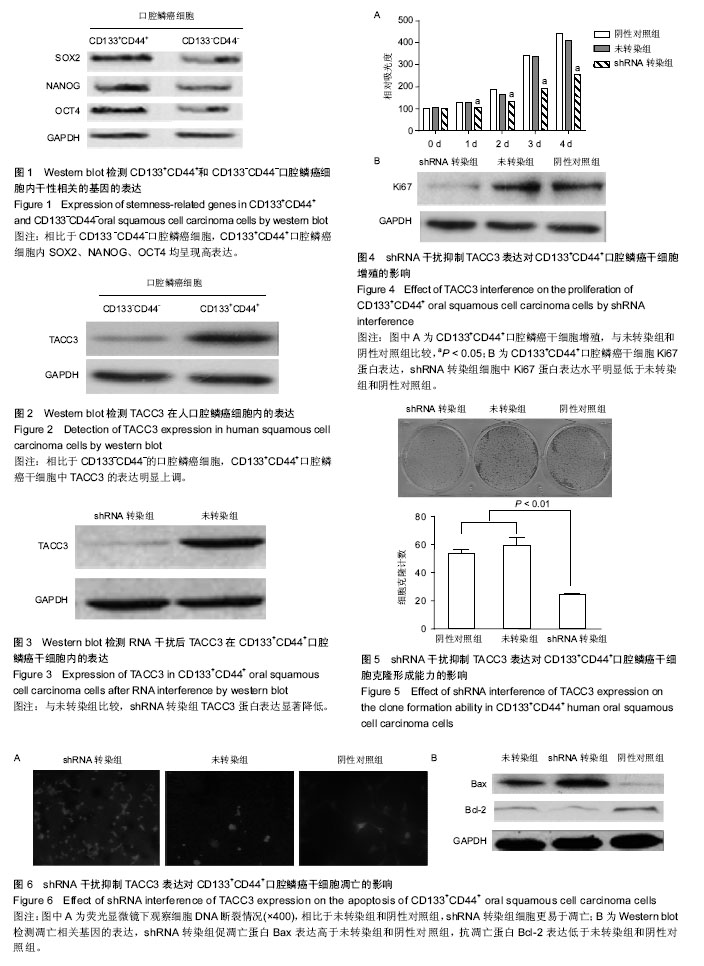| [1] Metcalfe E,Aspin L,Speight R,et al.Postoperative (Chemo)Radiotherapy for Oral Cavity Squamous Cell Carcinomas: Outcomes and Patterns of Failure.Clin Oncol(R Coll Radiol).2017;29(1):51-59. [2] Parajuli H,Teh MT,Abrahamsen S,et al.Integrin alpha11 is overexpressed by tumour stroma of head and neck squamous cell carcinoma and correlates positively with alpha smooth muscle actin expression.J Oral Pathol Med.2016. doi:10.1111/jop.12493.[Epub ahead of print][3] Reddy SS,SharmaS,Mysorekar V. Expression of Epstein Barr Virus among oral potentially malignant disorders and oral squamous cell carcinomas in the South Indian tobacco chewing population.J Oral Pathol Med.2016.doi: 10.1111/jop.12508. [Epub ahead of print][4] Shen L,Liu L,Ge L,et al.miR-448 downregulates MPPED2 to promote cancer proliferation and inhibit apoptosis in oral squamous cell carcinoma.Exp Ther Med.2016;12:2747-2752.[5] Hamburger AW,Salmon SE.Primary bioassay of human tumor stem cells.Science. 1977;197(4302):461-463.[6] Valent P,Bonnet D,De Maria R,et al.Cancer stem cell definitions and terminology: the devil is in the details.Nat Rev Cancer.2012;12(11):767-775.[7] Li Q,Yao Y,Eades G,et al.Downregulation of miR-140 promotes cancer stem cell formation in basal-like early stage breast cancer.Oncogene.2014;33(20):2589-2600.[8] 蔡传书,王培荣,黄雄,等.5种肿瘤干细胞标志物在非小细胞肺癌组织中的表达及临床意义[J].中国老年学杂志,2016,36(23): 5905-5907.[9] 孔令帅,温树信,高伟,等.喉癌Hep-2细胞CD44+CD133+生物学特性研究[J].中国现代医药杂志,2016,18(3):1-6.[10] Brescia P,Ortensi B,Fornasari L,et al.CD133 is essential for glioblastoma stem cell maintenance.Stem Cells.2013;31(5): 857-869.[11] 陈超,葛明华,王可敬,等.悬浮培养法富集头颈部鳞癌肿瘤干细胞及其功能研究[J].中华肿瘤杂志,2014,36(1):17-22.[12] Raff JW.Centrosomes and cancer:lessons from a TACC.Trends Cell Biol.2002; 12(5):222-225.[13] Piekorz RP,Hoffmeyer A,Duntsch CD,et al.The centrosomal protein TACC3 is essential for hematopoietic stem cell function and genetically interfaces with p53 regulated apoptosis. EMBO J.2002;21(4):653-664.[14] Lauffart B,Vaughan MM,Eddy R,et al.Aberrations of TACC1 and TACC3 are associated with ovarian cancer.BMC Womens Health.2005;5:8.[15] Nahm JH,Kim H,Lee H,et al.Transforming acidic coiled-coil-containing protein 3 (TACC3) overexpression in hepatocellular carcinomas is associated with "stemness" and epithelial-mesenchymal transition-related marker expression and a poor prognosis. Tumour Biol.2016;37:393-403.[16] Zhou DS,Wang HB,Zhou ZG,et al.TACC3 promotes stemness and is a potential therapeutic target in hepatocellular carcinoma.Oncotarget.2015;6:24163-24177.[17] 杨俊岭,高伟,王珏,等.喉癌TU177细胞系中CD133+CD44+肿瘤干细胞分选及特性分析[J].智慧健康,2016,2(1):5-8.[18] 孔令帅,温树信,高伟,等.喉癌Hep-2细胞CD44+CD133+生物学特性研究[J].中国现代医药杂志,2016,18(3):1-6.[19] 龚锐,李胜英,霍志霞,等.自制免疫磁珠在前列腺肿瘤组织干细胞提取中的应用[J].中国组织工程研究,2016,20(1):36-41.[20] 秦亮,陈安民,郭风劲,等.免疫磁珠法分离并鉴定前列腺癌类干细胞[J].中华全科医学,2013,11(3):336-337,340.[21] Fu W,Tao W,Zheng P,et al.Clathrin recruits phosphorylated TACC3 to spindle poles for bipolar spindle assembly and chromosome alignment.J Cell Sci.2010;123(Pt 21): 3645-3651.[22] 曾亚,王新平,中月明,等.胃癌组织中Aurora-A及TACC3的表达及意义[J].实用预防医学,2016,23(10):1257-1259.[23] 侯婧,刘胜春,李鹍鹏,等.TACC3 mRNA及蛋白在乳腺癌中的表达及其临床意义[J].中国肿瘤临床,2012,39(20):1535-1538.[24] Mahdipour M,Leitoguinho AR,Zacarias Silva RA,et al.TACC3 Is Important for Correct Progression of Meiosis in Bovine Oocytes.PLoS One.2015;10:e0132591.[25] Piekorz RP,Hoffmeyer A,Duntsch CD,et al.The centrosomal protein TACC3 is essential for hematopoietic stem cell function and genetically interfaces with p53-regulated apoptosis.EMBO J.2002;21:653-664.[26] Schneider L,Essmann F,Kletke A,et al.TACC3 depletion sensitizes to paclitaxel-induced cell death and overrides p21WAF-mediated cell cycle arrest.Oncogene.2008;27: 116-125.[27] Suhail TV,Singh P,Manna TK.Suppression of centrosome protein TACC3 induces G1 arrest and cell death through activation of p38-p53-p21 stress signaling pathway.Eur J Cell Biol.2015;94:90-100.[28] Piekorz RP,Hoffmeyer A,Duntsch CD,et al.The centrosomal protein TACC3 is essential for hematopoietic stem cell function and genetically interfaces with p53-regulated apoptosis .EMBO J.2002;21(4):653-664.[29] Gómez-Baldó L1,Schmidt S,Maxwell CA,et al.TACC3-TSC2 maintains nuclear envelope structure and controls cell division.Cell Cycle.2010;9(6):1143-1155. |

